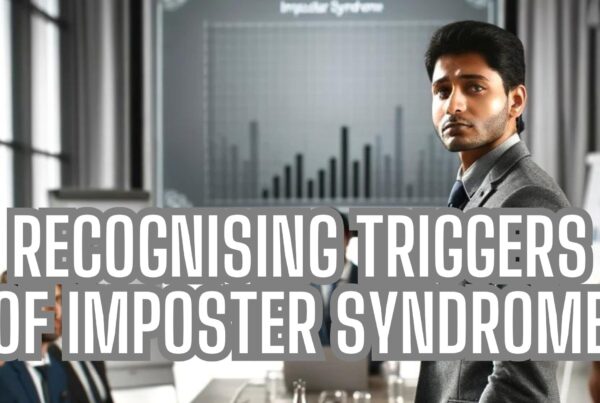Understanding Imposter Syndrome: A Deep Dive into Its Roots and Consequences
Understanding Imposter Syndrome
It is widely recognised that Imposter Syndrome affects countless professionals and students across the globe. No matter what industry you choose to explore, you will find people affected by Imposter Syndrome. This phenomenon is not limited by industry, academic standing, or professional status. Instead, it seeps into the lives of individuals who find themselves doubting their accomplishments and fearing that they will be exposed as a fraud. In understanding Imposter Syndrome, people can gain a better understanding of the why and how, and aim to overcome it.
In 2020, a systematic review of 62 studies evaluated prevalence of imposter syndrome, showing rates as high as 56% to 82% in graduate students, college students, nurses, medical students, and other professions. The experience of Imposter Syndrome is felt more widely than what many people realise. Maybe you experience it too? If so, then this blog might be of interest to you. Read until the end to find details of our FREE email mini-course to help you better understand your experience.
The Origin of Imposter Syndrome
Imposter Syndrome was first identified in the 1970s by psychologists Suzanne Imes and Pauline Rose Clance. It was originally thought to affect primarily women, but further research has shown that it is an experience shared by men and women equally, across various fields and cultures. This syndrome is characterised by chronic self-doubt and intellectual fraudulence that override any feelings of success or external proof of competence.
Imposter syndrome is characterized by several key symptoms, including:
- Extreme lack of self-confidence and feelings of inadequacy
- Constant comparison to others and believing you don’t measure up
- Anxiety, self-doubt, and distrust in your own intuition and capabilities
- Negative self-talk and dwelling on past mistakes
- Irrational fears of being exposed as a fraud or incompetent
- Downplaying your knowledge, abilities and skills
- Overworking to cover up feelings of inadequacy
- Seeking excessive external validation and feedback
- Struggling with pressure and underperforming in stressful situations
- Seeing the world in black and white terms – you’re either the best or the worst
- Focusing on pleasing others to get validation rather than believing in yourself
The Psychological Underpinnings of Imposter Syndrome
The psychological landscape of Imposter Syndrome is complex and influenced by a variety of factors. These include personality traits such as perfectionism, the familial environment, and the adaptive responses to societal expectations. Cognitive-behavioral patterns play a significant role in the entrenchment of this syndrome. Individuals often set excessively high goals for themselves, and when they fail to meet these goals, the cycle of self-doubt begins.
Behavioural psychologists suggest that Imposter Syndrome is often linked with specific behaviors learnt over time. For example, if a person is repeatedly praised only for their achievements, rather than their effort, they may grow to believe that they must achieve to be worthy of recognition. This belief can fuel the syndrome, as the individual feels they are not truly deserving of accolades.
Understanding Imposter Syndrome As a Shame Message
Imposter Syndrome can often be linked to a shame message that the individual may be experiencing as well. Shame can often be a deeply held feeling that an individual is ‘not good enough’. This may manifest as a belief of not being good enough, or smart enough, or experienced enough. Imposter syndrome involves intense feelings of self-doubt, anxiety, and fear of being exposed as a fraud, despite evidence of success. This fear of being “found out” as incompetent is tied to shame.
How Imposter Syndrome Affects Various Demographics
While Imposter Syndrome was initially associated with high-achieving women, it has become clear that it can affect anyone, regardless of their gender, race, or background.
However, the way it impacts different groups can vary significantly. For instance, minorities and underrepresented groups in various professions may experience this syndrome more intensely due to external biases and internal pressures.
In the academic world, students often struggle with Imposter Syndrome. They may feel like they do not truly belong in their programs, especially in highly competitive environments. Similarly, in the corporate world, new employees or those who have received rapid promotions may feel as though they do not truly deserve their positions.
Addressing the Impact of Imposter Syndrome
The impact of Imposter Syndrome can be profound, affecting personal well-being and professional development. It can lead to anxiety, depression, and a crippling fear of failure that hinders career progression and personal growth. Recognising the signs of Imposter Syndrome is the first step towards addressing it.
Once identified, strategies can be implements to help alleviating these feelings. Encouraging open discussions about failures as well as successes in professional environments can also help in normalizing the feelings associated with Imposter Syndrome.
By understanding Imposter Syndrome, individuals are better equipped to identify signs in themselves and others. This understanding is crucial in developing strategies to combat the negative feelings and promote a healthier, more realistic self-assessment.
Understanding Imposter Syndrome Is Not a Life Sentence
Understanding Imposter Syndrome is not a life sentence. With the right knowledge and tools, it is possible to transform this self-doubt into self-empowerment. Addressing this syndrome effectively requires not only individual effort but also a cultural shift in how achievements and failures are perceived and discussed.
If you’re ready to gain an understanding of Imposter Syndrome, Release Hypnosis has a FREE mini-course available on email. All you need to do is enter your details here, and you’ll be sent 7 weekly emails.
Release Hypnosis Melbourne Hypnotherapy
Since 2016, Lawrence Akers has been working under the name Release Hypnosis offering Hypnotherapy and ACT based work to the people of Melbourne or an online service. Based on St Kilda Rd, Release Hypnosis is an easy and convenient location to get to and accessible by the ANZAC station train and tram stop. Release Hypnosis can help with a wide range of presenting issues, and I offer a free 30 minute no obligation discovery call for those who are unsure if hypnotherapy is the right way forward for them.
Book Your FREE 30 Minute Consultation With Release Hypnosis NOW!
You may also like to read:
Exploring Content-Free Hypnotherapy
The Journey to Becoming a Better Hypnotic Subject
Best Hypnotherapy Resources 2023: Release Hypnosis Top Blogs
What Is The Success Rate of Hypnosis?
Release Hypnosis Melbourne Hypnotherapy is accessible for people in: Abbotsford, Armadale, Albert Park, Balwyn, Bentleigh, Black Rock, Box Hill, Brighton, Brunswick, Bulleen, Bundoora, Camberwell, Canterbury, Carnegie, Caulfield, Chadstone, Cheltenham, Clayton, Coburg, Collingwood, Deer Park, Doncaster, Elsternwick, Eltham, Elwood, Epping, Essendon, Fairfield, Fitzroy, Footscray, Glen Iris, Glen Waverley, Glenhuntly, Greensborough, Hampton, Hawthorn, Heidelberg, Highet, Ivanhoe, Kew, Kooyong, Lalor, Laverton, Lower, Plenty, Macleod, Malvern, Middle Park, Moonee Ponds, Melbourne, Moorabbin, Mount Waverley, Murrumbeena, Northcote, Oakleigh, Ormond, Parkville, Pascoe Vale, Port Melbourne, Prahran, Preston, Richmond, Rosana, Sandringham, South Yarra, South Melbourne, Spotswood, St Albans, St Kilda, Surrey Hills, Templestowe, Thornbury, Toorak, Tullamarine, Williamstown, Yarraville, North Melbourne, Windsor, East Melbourne, Melbourne, Melbourne CBD, Melbourne 3004








